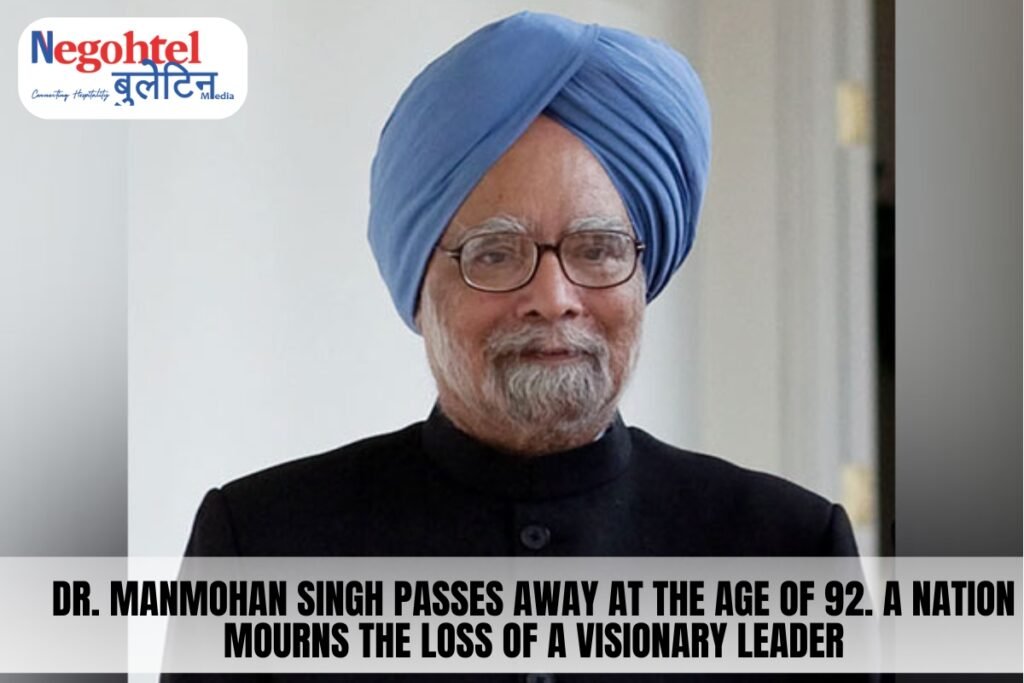India’s 13th Prime Minister, Dr. Manmohan Singh, died late Thursday night at AIIMS Delhi at the age of 92. The announcement of his demise at 9:51 PM is buried while the nation mourns a man who was a visionary leader and who also had a brain that changed India for ever.
A Legacy of Leadership
Dr. Manmohan Singh is the first Sikh Prime Minister of India circles who served India and headed the Congress-led United Progressive Alliance (UPA) government from May 2004 to May 2014. He is known for his simple living and high thinking; his mastery over economics, along with pragmatism and abdillah statesmanship, reflected India’s major economic measures and firming of India’s diplomatic relations.
Nation Declares Mourning
The Indian government has called for a seven-day mourning period in honour of the late former Prime Minister. His funeral will be the last rites in the nearest vicinity to Rajghat in Delhi on Saturday. Members of the public are invited to pay their final respects to Dr. Singh today, as his mortal remains will be placed at the AICC headquarters.
Condolences and Tributes from all parts of the World
There is a lot of condolence from leaders of nations in the wake of the tragedy. U.S. Secretary of State Antony Blinken said that Dr. Singh was “one of the greatest advocates of the U.S.-India relationship” as he stressed Dr. Singh’s contribution to the signing of the U.S.-India Civil Nuclear Cooperation Agreement.
Modi said Singh, who has recently taken charge of the Ministry of Defense, has described his contributions to the process of reconstructing the Indian economy during the difficult period. Tamil Nadu Chief Minister MK Stalin will also attend the final rites.
Congress and RSS Pay Homage
The Congress party itself has been affected by the defeat and has called off all its programs, including the convention at Belgaum. As expected, even the RSS has conveyed its condolences to the family and followed it up by stating that they had ‘a lot of respect’ for the deceased—Dr. Singh was a respectable figure across party lines.
A Life of Achievements
Dr. Manmohan Singh’s legacy is characterized by transformative economic policies that spearheaded India’s growth. As the architect of India’s liberalization in 1991, his efforts as Finance Minister under PM Narasimha Rao pulled the country out of an economic crisis and paved the way for globalization.
Manmohan Singh’s Key Reforms that Shaped the Indian Economy
Dr. Manmohan Singh, a distinguished economist , played a transformative role in India’s economic history. Serving as Finance Minister in 1991 and later as Prime Minister (2004–2014), his policies addressed economic crises and catalyzed growth.
1991 Economic Crisis and Reforms
India faced a severe economic crisis in 1991, with depleting foreign reserves, rising inflation, and a balance of payments crisis. Appointed as Finance Minister by Prime Minister Narasimha Rao, Singh introduced sweeping reforms focusing on liberalisation, privatisation, and globalisation:
- Currency Devaluation & Trade Liberalisation: Devalued the rupee, reduced import tariffs, and removed trade restrictions, integrating India with global markets.
- Industrial Policy Reforms: Ended the Licence Raj, deregulating 80% of industries and fostering private enterprise and foreign investment.
- Banking & Financial Sector Changes: Implemented Narasimham Committee recommendations, reducing statutory liquidity and cash reserve ratios, liberalising banking operations, and creating a competitive financial system.
Legacy as Prime Minister
As Prime Minister, Singh championed initiatives targeting rural and underprivileged populations, recognising that inclusive growth was essential.
- MGNREGA (2005): Guaranteed 100 days of wage employment annually for rural households, reducing poverty and unemployment.
- Right to Information (RTI) & Right to Education (RTE): empowered citizens with transparency in governance and ensured free education for children aged 6–14.
Also Check:- Welcomhotel By ITC Hotels, Jabalpur: A Fusion Of Luxury, Culture And Modern Comfort
Impact and Legacy
Dr. Manmohan Singh’s reforms modernised India’s economy, strengthened its banking system, and dismantled restrictive socialist controls, fostering job creation and industrial growth. His policies positioned India as one of the world’s fastest-growing economies, earning him recognition as the architect of modern India’s economic journey.
His humility, academic brilliance, and vision for India’s integration into the global economy remain an enduring legacy. As the nation mourns his passing, Dr. Singh is celebrated as a leader who shaped India’s future.



